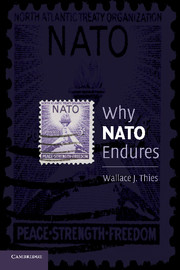Crossref Citations
This Book has been
cited by the following publications. This list is generated based on data provided by Crossref.
Davidson, Jason W.
2011.
America's Allies and War.
p.
1.
2011.
Lectures critiques.
Revue française de science politique,
Vol. Vol. 61,
Issue. 4,
p.
727.
Williams, M. J.
2011.
The Good War.
p.
117.
HOFMANN, STÉPHANIE C.
2011.
Why Institutional Overlap Matters: CSDP in the European Security Architecture.
JCMS: Journal of Common Market Studies,
Vol. 49,
Issue. 1,
p.
101.
2011.
Understanding Russian Politics.
p.
371.
Thies, Wallace J.
2012.
Is the EU Collapsing?.
International Studies Review,
Vol. 14,
Issue. 2,
p.
225.
Flockhart, Trine
2012.
Towards a strong NATO narrative: From a ‘practice of talking’ to a ‘practice of doing’.
International Politics,
Vol. 49,
Issue. 1,
p.
78.
Saideman, Stephen M.
and
Auerswald, David P.
2012.
Comparing Caveats: Understanding the Sources of National Restrictions upon NATO’s Mission in Afghanistan1.
International Studies Quarterly,
Vol. 56,
Issue. 1,
p.
67.
Edström, Håkan
and
Gyllensporre, Dennis
2012.
Pursuing Strategy.
p.
1.
Matlary, J. H.
and
Petersson, M.
2013.
NATO's European Allies.
p.
1.
Petersson, M.
2013.
NATO's European Allies.
p.
25.
Hallams, Ellen
2013.
NATO beyond 9/11.
p.
217.
Webber, Mark
2013.
NATO beyond 9/11.
p.
27.
Rühle, Michael
2013.
NATO beyond 9/11.
p.
54.
Williams, Michael John
2013.
Enduring, but irrelevant? Britain, NATO and the future of the Atlantic alliance.
International Politics,
Vol. 50,
Issue. 3,
p.
360.
Coletta, D.
and
García, D.
2013.
NATO's European Allies.
p.
178.
Flockhart, Trine
2013.
NATO's nuclear addiction – 12 steps to ‘kick the habit’.
European Security,
Vol. 22,
Issue. 3,
p.
271.
Hodge, Carl Cavanagh
2013.
NATO beyond 9/11.
p.
67.
Dembinski, Matthias
2014.
Handbuch Internationale Beziehungen.
p.
1.
Burton, Joe
2015.
NATO’s cyber defence: strategic challenges and institutional adaptation.
Defence Studies,
Vol. 15,
Issue. 4,
p.
297.





